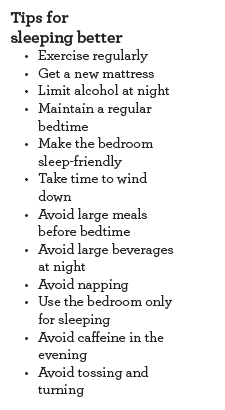
Excerpted from an article by Annie Lennon — Fact checked by Rita Ponce, Ph.D.
Sleep is essential for maintaining key bodily functions and mental health. Sleep deprivation has multiple health consequences, including heart disease, diabetes, and depression.
Research also shows that inadequate sleep is associated with obesity. Studies also show that those with irregular sleep cycles are at a greater risk of obesity and cardiometabolic risk.
Understanding more about how sleep affects obesity risk could aid the development of effective treatment and prevention strategies for the condition.
Recently, researchers investigated the effects of sleep quality on the compliance with a weight loss program. They found that better sleep was linked to greater adherence to a 12-month weight loss intervention. The study was presented at the American Heart Foundation’s Epidemiology, Prevention, Lifestyle, and Cardiometabolic Health Scientific Sessions 2023.
How better sleep changes behavior. For the study, the researchers recruited 125 adults with overweight or obesity and an average age of 50 years old. Each took part in a 12-month behavioral weight loss intervention. It is interesting to note the researchers also found a statistically insignificant link between sleep quality and physical activity.
Linking sleep and weight loss. When you sleep, your body goes through specific changes that enable the type of rest that is vital to your overall healthy. Good sleep allows for the brain to repair and revise synapses, enhancing the ability to modify behavior. It also provides more energy and focus the next day, making exercise more vigorous and effective. Over the long-term, that can help you adhere to a weight loss program.
Pull Quote:
‘Lack of sleep is a stressor on the body, especially on cardiometabolic health. Lack of sleep activates several physiological pathways that can result in excessive glucose in the bloodstream or increased insulin resistance over time which has been tied to increased body fat, especially around the abdominal region. Better sleep can moderate the relationship between weight loss interventions and weight loss outcomes.” — Dr. Sarah-Nicole Bostan
How sleep affects appetite. The body’s sleep and wake cycles are controlled by a natural rhythm called circadian rhythmicity. Circadian rhythm affects two hormones called ghrelin and leptin, which help regulate appetite and how much you eat. When you don’t get enough sleep, the hormone that makes you hungry, ghrelin, increases, and the hormone that makes you feel full, leptin, decreases. These unwanted changes can cause you to eat more, especially when tired or stressed.
A lack of sleep can also affect levels of cortisol, the stress hormone in your body. During your sleep cycle, the body is building, healing, and processing so that when you wake up, your cortisol, or stress hormone, is at its highest to kickstart the day. When you get suboptimal sleep, you miss out on the REM sleep that helps to regulate your cortisol levels. Cortisol is a glucocorticosteroid directly linked to blood sugar and metabolism. When cortisol is out of rhythm, so is your blood sugar. It can lead to fatigue and sugar cravings, making it much more challenging to adhere to weight loss interventions.
Note that authors indicate that the study still doesn’t answer the question: “does better sleep lead to more adherence to a weight loss plan?”
How much sleep do we need?
Everyone needs 8 hours. As with many aspects of human biology, there is no one-size-fits-all approach to sleep. Overall, research suggests that for healthy young adults and adults with normal sleep, 7–9 hours is an appropriate amount.
The story gets a little more complicated, though. The amount of sleep you need each day varies throughout your life:
- newborns need 14–17 hours
- infants need 12–15 hours
- toddlers need 11–14 hours
- preschoolers need 10–13 hours
- school-aged children need 9–11 hours
- teenagers need 8–10 hours
- adults need 7–9 hours
- older adults need 7–8 hours
Are daytime naps unhealthy?
Generally, experts recommend people avoid naps to ensure a better night’s sleep. However, if someone has missed out on sleep during previous nights, a tactical nap can help repay some of the accrued sleep debt.
Around 20 minutes is a good nap length. This gives the body ample time to recharge. People who sleep much longer than this could mean they descend into a deep sleep, and once awake, they feel groggy.
Daytime napping is relatively common in the United States but taking a “siesta” is the norm in some countries. Naturally, our bodies tend to dip in energy during the early afternoon, so perhaps napping around that time is more natural than avoiding sleep until nighttime.
It is also important to note if an individual experiences severe tiredness during the day, this might be a sign of a sleep disorder, such as sleep apnea.
Scientists will need to conduct more research before they can finally put all the napping myths and mysteries to bed.
Overall, you should try and aim for 7–9 hours’ sleep every night. It sounds simple, but in your electronic lit, bustling, and noisy lives, it is more challenging than you might like. All you can do is keep trying to give sleep the space that it needs.
When to see a doctor: People who are still having sleeping difficulties after trying to improve their sleep habits should seek medical advice. A doctor can assess a person for sleep disorders and other conditions that can affect sleep. They can also advise on possible treatment options.
In summary, getting enough sleep can improve a person’s energy levels, performance, safety, and overall health. Practicing good sleep hygiene and making certain lifestyle changes can help people get a better night’s sleep.
Sources: https://www.medicalnewstoday.com/articles/can-poor-sleep-impact-your-weight-loss-goals#Why-sleep-hygiene-education-is-needed; https://www.medicalnewstoday.com/articles/325303#tossing-and-turning
# # #


